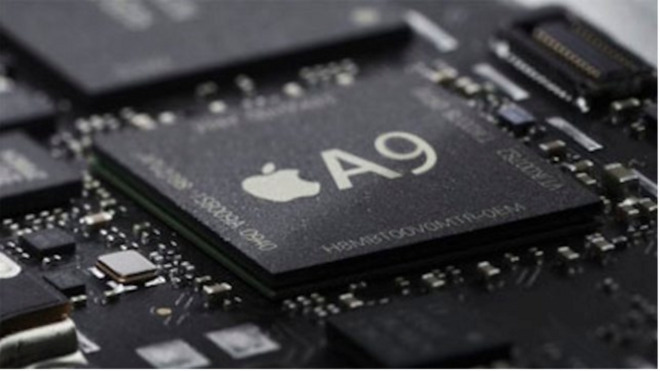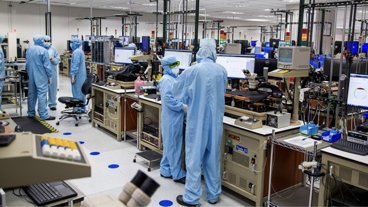Apple A-series chip supplier Samsung this week announced plans to put an advanced 10-nanometer chip fabrication process into production later this year, with the new technology supposedly affording a 10 percent increase in efficiency over existing iterations.
According to Re/code, Samsung met with major chipmakers in Silicon Valley to push its cutting-edge manufacturing technologies and fabrication facilities, announcing plans to roll out new 14-nanometer and 10-nanometer processes. The Korean tech giant's 14nm process, once the industry standard, has been surpassed by offerings from competitors like Intel and Taiwan Semiconductor Manufacturing Co., the latter of which produces Apple's latest A-series silicon.
"We think we are leading again," said Kelvin Low, senior director at Samsung Semiconductor. "This is not a one-time success story."
While Samsung's upcoming low-cost 14nm tech might not be of interest to Apple, the 10nm process could one day find its way into future iOS devices. After being ousted as Apple's sole chip fab in 2014, Samsung is looking to reclaim a significant share of orders for iPhone and iPad silicon. A second-generation process is on the roadmap, but an exact timeline to production has not been announced.
Apple diversified A-series chip production by bringing TSMC into the fold in 2014, with the Taiwanese company winning a contract to fabricate a majority of the A8 SoCs powering iPhone 6 and 6 Plus. The A8 and A8X are built on a 20nm process.
Samsung regained momentum last year, sharing manufacturing duties for Apple's A9 design with TSMC. The exact breakdown is unknown, but rumors suggest most A9 SoCs are built using Samsung's 14nm process, while a small percentage use TSMC's 16nm FinFET process. Apple's step-up A9X model, however, is fabricated on TSMC's 16nm FinFET process.
Shortly after iPhone 6s launched, reports surfaced claiming huge variations in battery life between A9 chips made by Samsung and those from TSMC. Specifically, stress tests seemingly proved iPhone 6s models powered by TSMC's A9 lasted up to two hours longer than those with a Samsung chip. Apple quickly addressed the issue by noting the tests were not indicative of real-world use, adding that its own data showed a variance of only 2 to 3 percent.
According to the latest industry rumors, TSMC has won most — or all — orders for Apple's "A10" design expected to debut in "iPhone 7." Recent reports claim the Taiwan firm is set to ramp up production of the 16nm FinFET process chips in the second quarter of 2016. Earlier this week, the company said it expects to trial 7nm production in the first half of 2018.
Update: Samsung clarified that its second-generation 10nm technology roadmap was not announced. The original article incorrectly said the process would go into mass production in 2016.
 Mikey Campbell
Mikey Campbell







-m.jpg)






 Charles Martin
Charles Martin
 Marko Zivkovic
Marko Zivkovic
 Andrew Orr
Andrew Orr
 Amber Neely
Amber Neely

 William Gallagher and Mike Wuerthele
William Gallagher and Mike Wuerthele










12 Comments
Interesting that Samsung used a smaller die in the current A9s than did TSMC, but TSMCs chips were still more efficient. Could it be that Samsung's quality is something less than stellar?
I have grown to trust Apple with regard to their products. If that makes me an iSheep, then I guess that's what I am.
Enjoy your 10nm Samsung S8 that will run Android's massive collection of malware slightly faster than ever.
Samsung: true technology powerhouse. Apple: true marketing powerhouse.
Wow...that's about the most damning thing I've ever read about Samsung. Tit for tat, they couldn't compete, with seemingly much larger resources. Now Apple is going with TSMC for iPhone 7...big win for them. I hope they ramp 'down' quickly to smaller processes.
The word 10nm in this case is a bit of a laugh, in fact the naming of processes has gone complete "marketing" and is utterly divorced from actual reality.
7 or 10 hogwash would be more appropriate for any of those process ;-).